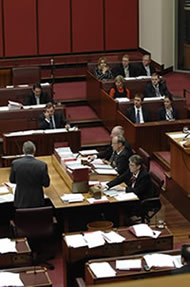117 Order of consideration
-
The following order shall be followed in considering a bill:
-
Clauses as printed, and proposed new clauses.
-
Postponed clauses (not having been specially postponed till consideration of other clauses).
-
Schedules as printed.
-
Proposed new schedules.
-
Preamble.
-
Title.
-
In reconsidering a bill, the same order shall be observed as far as possible.
-
In reading the clauses of a bill it shall be sufficient to read the numbers only.
-
The discussion shall be confined to the clause or amendment before the committee.
-
A clause may be postponed, whether or not it has been amended.
Amendment history
Adopted: 19 August 1903 as SO 193 (corresponding to paragraphs (1) and (2)) and SOs 194, 197 and 199 (corresponding to paragraphs (3), (4) and (5)) but renumbered as SOs 192, 193, 196 and 198 for the first printed edition
Amended: 9 September 1909, J.121 (to take effect 1 October 1909) (lifting previous prohibition on postponing a clause if it had already been amended – paragraph (5))
1989 revision: Old SOs 199, 200, 203 and 205 combined into one, restructured as five paragraphs and renumbered as SO 117; removal of the phrase “unless otherwise ordered” and a reference to marginal notes in paragraph (3); and modernisation of language
Commentary

The Nation-Building Funds Bill 2008 being considered in committee of the whole. Nowadays, bills are invariably 'taken as a whole, by leave' in committee to allow any part of them to be discussed or ammended (Photo courtesy of AUSPIC)
Apart from an amendment to paragraph (5) in 1909 to allow greater flexibility in dealing with bills in committee of the whole by allowing clauses to be postponed whether or not they had been amended, SO 117 remains more or less in its original form. What is now paragraph (2) was the subject of some debate in 1903 and the paragraph was significantly altered by amendment. Whereas the Standing Orders Committee had recommended a form of this provision that it thought would be acceptable to a majority of senators:
And in reconsidering the Bill, which can only be done upon Recommittal, the same principle shall be followed,
Senator Symon (FT, SA) argued successfully for the adoption of the South Australian practice which the Senate had been using and which allowed for the bill to be reconsidered before it was reported out of committee.[1] This was an additional opportunity for reconsideration which had been found to be very convenient in practice. President Baker argued against the amendment on the practical ground that reconsideration of a bill was easier with a fair print of the bill available and that recommittal was therefore the better option, but he did not have strong views about the matter and said nothing more once another South Australian, Senator Playford (Prot, SA), spoke strongly in favour of Symon’s amendment.[2]
As noted in the previous standing order, the now almost universal practice of taking bills as a whole, by leave, means that this standing order is rarely, if ever, used but remains available should circumstances make it a better method of proceeding or should any senator insist upon it (by refusing leave to depart from it).